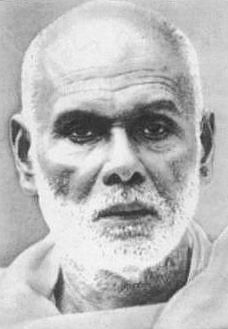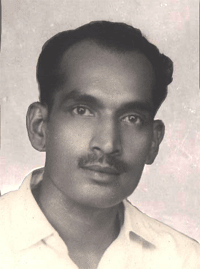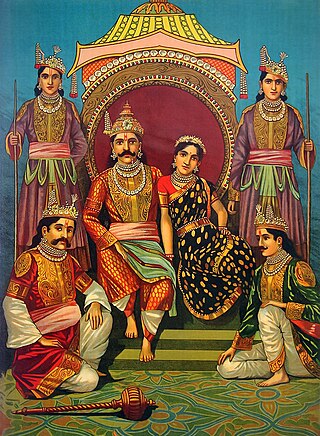Related Research Articles

Sree Narayana Guru was a philosopher, spiritual leader and social reformer in India. He led a reform movement against the injustice in the caste-ridden society of Kerala in order to promote spiritual enlightenment and social equality. A quote of his that defined his movement was "one caste, one religion, and one god for all human beings." He is the author of the Advaita poem Daiva Dasakam, which is one of the most used poem in Kerala for community prayer.

Panikkassery Keshavan "P.K." Balakrishnan was an Indian novelist and critic. A doyen of Malayalam literature, he is best known for his novel, Ini Njan Urangatte, a novel based on Mahabharata as well as a number of critical studies which include Chandu Menon Oru Padanam, Novel Siddhiyum Sadhanayum, Kavyakala Kumaranasaniloode, and Ezhuthachante Kala: Chila Vyasabharatha Patanangalum. His Jathivyavasthayum Kerala Charitravum is a work in social history.

Mahakavi Kumaran Asan was a poet of Malayalam literature, Indian social reformer and a philosopher.He is known to have initiated a revolution in Malayalam poetry during the first quarter of the 20th century, transforming it from the metaphysical to the lyrical and his poetry is characterised by its moral and spiritual content, poetic concentration and dramatic contextualisation. He is one of the triumvirate poets of Kerala and a disciple of Sree Narayana Guru. He was awarded the prefix "Mahakavi" in 1922 by the Madras university which means "great poet".
Kumbalathuparambu Ayyappan, better identified as Sahodaran Ayyappan, was a social reformer, thinker, rationalist, journalist, and politician from Kerala, India. As a vocal follower of Sree Narayana Guru, he was associated with a number of events related to the Kerala reformation movement and was the organizer of Misra Bhojanam in Cherai in 1917. He founded Sahodara Sangam, and the journal Sahodaran and was the founder editor of the magazine Yukthivadi.
The caste system in Kerala differed from that found in the rest of India. While the Indian caste system generally divided the four-fold Varna division of the society into Brahmins, Kshatriyas, Vaishyas and Shudras, in Kerala, there existed only two varnas: Brahmins and Shudras, out of these four, while others were classified as Avarna. The Malayali Brahmins formed the priestly class. Brahmins labeled all other castes as "Sat-sudra", "Shudra" and "Avarna" based on their origin and ritual rank. The exception to this were Kings in Kerala like of Travancore and Cochin, who were ritually promoted to the status of Kshatriya by means of the Hiranyagarbha ceremony.

The Nambudiri, also transliterated as Nampoothiri, Nambūdiri, Namboodiri, Namboothiri and Nampūtiri, are a Malayali Brahmin caste, native to what is now the state of Kerala, India, where they constituted part of the traditional feudal elite. Headed by the Azhvanchery Thamprakkal Samrāṭ, the Nambudiris were the highest ranking caste in Kerala. They owned a large portion of the land in the region of Malabar, and together with the Nair monarchs, the Nambudiris formed the landed aristocracy known as the Jenmimar, until the Kerala Land Reforms starting in 1957.

Padmanabhan Palpu was a physician from the Kingdom of Travancore who served as a chief medical officer of Mysore State.
Panicker was an honorary title conferred by the King of Travancore in Kerala to distinguished individuals. This title was given to prominent Nair, Saint Thomas Christians, Kaniyars and Ezhavas.
Chekavar were the warriors belonging to Hindu Thiyya community in Malabar of Kerala. Many Thiyya families today trace their roots to this Chekavar lineage.

The Ezhavas, also known as Thiyya or Tiyyar in the Malabar region, are a community with origins in the region of India presently known as Kerala, where in the 2010s they constituted about 23% of the population and were reported to be the largest Hindu community. The Malabar Ezhava group has claimed a higher rank in the Hindu caste system than the other Ezhava groups but was considered to be of a similar rank by colonial and subsequent administrations.

T. K. Madhavan Alias Deshabhimani Madhavan, was an Indian social reformer, journalist and revolutionary, who was involved with the Sree Narayana Dharma Paripalana Yogam. He hailed from Kerala and led the struggle against Social discrimination which was known as Vaikom Satyagraha.

Arattupuzha Velayudha Panicker, also known as Kallisseril Velayudha Perumal, was a 19th-century social reformer and warrior, known for his fight against many social evils prevalent in the state of Kerala. He was born into an affluent Ezhava family known as Kallisseril, in the small independent province called Mangalam, near Haripad in Alappuzha district.

Moorkoth Kumaran (1874–1941) was a social reformer, a teacher and a writer in Malayalam. He came from a Thiyya family of Telicherry. He was a disciple of Narayana Guru and wrote the first biography of Guru. He also published some of the earliest short stories and novels in Malayalam.

C. V. Kunhiraman was an Indian social reformer, journalist and the founder of Kerala Kaumudi daily. A follower of Sree Narayana Guru, Kunhiraman was the author of a number of books covering the genres of novels, short story, poetry, biographies and essays. He was one of the leaders involved in the Vaikom Satyagraha of Reformation movement in Kerala which led to the Temple Entry Proclamation.

Polyandry in India refers to the practice of polyandry, whereby a woman has two or more husbands at the same time, either historically on the Indian subcontinent or currently in the country of India. An early example can be found in the Hindu epic Mahabharata, in which Draupadi, daughter of the king of Panchala, is married to five brothers.

Vaikom Satyagraha, from 30 March 1924 to 23 November 1925, was a nonviolent agitation for access to the prohibited public environs of the Vaikom Temple in the Kingdom of Travancore. Kingdom of Travancore was known for its rigid and oppressive caste system. The campaign was conduct and led by Congress, leadersT. K. Madhavan, K. Kelappan, K. P. Kesava Menon. Other notable leaders who participated in the campaign include George Joseph, E. V. Ramasamy "Periyar" and it was noted for the active support and participation offered by different communities and a variety of activists.

Āśān is a Malayalam and Tamil surname and title that means teacher or guide.
Vivekodayam is a Malayalam literary journal established in 1904 to serve as a voice of the underprivileged communities in the Indian state of Kerala. It was founded by Kumaran Asan, a prominent poet of malayalam literature, social reformer, disciple of Narayana Guru and founder-secretary of the associated SNDP Yogam, who was inspired by the teachings of Swami Vivekananda.

The reformation movement in Kerala refers to a socio-cultural shift that began in the late 19th century, resulting in significant transformations in the social fabric of the southern Indian state of Kerala.
References
- ↑ Pullappilly, Cyriac. Religion and Social Conflict in South Asia. p. 32.
- ↑ Damodaran, Harish (25 November 2018). INDia's NEW CAPITALISTS: Caste, Business, and Industry in a Modern Nation. Hachette India. ISBN 9789351952800.
- 1 2 Nadhapuram, Kunjikkannan. Vadakkan Pattukal.
- ↑ Smith, Bardwell L. (1976). Religion and social conflict in South Asia. International studies in sociology and social anthropology. Vol. 22. BRILL. pp. 35–39. ISBN 978-90-04-04510-1.
- ↑ Tharamangalam, Joseph (1981). Agrarian Class Conflict: The Political Mobilization of Agricultural Labourers in Kuttanad, South India. Canada: The University of British Columbia. p. 38. ISBN 0-7748-0126-3.
- 1 2 Mathew, George (1989). Communal Road To A Secular Kerala. New Delhi: Ashok Kumar Mittal Concept Publishing Company. pp. 90–110. ISBN 81-7022-282-6.
- ↑ "The Great Malabar Novel". Rediff.com.
- ↑ Nair, Perrunna K. N. "Some prominent leaders of the freedom struggle in Kerala". Press Information Bureau, Government of India. Retrieved 3 November 2011.[ dubious – discuss ]
- ↑ Surendran, P. K. (17 July 2002). "Bridging the Nair-Ezhava divide". The Times of India . TNN. Archived from the original on 7 July 2012. Retrieved 15 November 2011.
- ↑ "'Some people remind me of my caste quite often,' says Kerala CM Pinarayi Vijayan". 3 January 2019.
- ↑ Lukose, Ritty A. (2010). "Recasting the Secular: Religion and Education in Kerala, India". In Mines, Diane P.; Lamb, Sarah (eds.). Everyday Life in South Asia (2nd ed.). Indiana University Press. pp. 209–210. ISBN 9780253354730.
- ↑ Krishanan IAS, NR (1967). Izhavar Annum Innum. Trissur: Seena Publications. p. 119.
- ↑ Smith, Bardwell L. (1976). Pullapilly, Cyriac K. (1976). "The Izhavas of Kerala and their Historic Struggle for Acceptance in the Hindu Society". In Smith, Bardwell L. Religion and Social Conflict in South Asia. International studies in sociology and social anthropology. 22. Netherlands: E. J. Brill. ISBN 978-90-04-04510-1. BRILL. ISBN 9004045104.